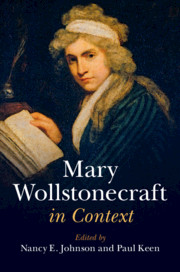Book contents
- Mary Wollstonecraft in Context
- Mary Wollstonecraft in Context
- Copyright page
- Contents
- Illustrations
- Notes on Contributors
- Preface
- Frontispiece
- Chronology
- Part I Life and Works
- Part II Critical Fortunes
- Part III Historical and Cultural Contexts
- The French Revolution Debate
- The Rights of Woman Debate
- Philosophical Frameworks
- Chapter 16 French Philosophes
- Chapter 17 Dissenters
- Chapter 18 Jean-Jacques Rousseau
- Chapter 19 Edmund Burke
- Chapter 20 William Godwin
- Chapter 21 Political Theory
- Chapter 22 Feminist Theory
- Legal and Social Culture
- Literature
- Suggested Further Reading
- Index
Chapter 17 - Dissenters
from Philosophical Frameworks
Published online by Cambridge University Press: 16 January 2020
- Mary Wollstonecraft in Context
- Mary Wollstonecraft in Context
- Copyright page
- Contents
- Illustrations
- Notes on Contributors
- Preface
- Frontispiece
- Chronology
- Part I Life and Works
- Part II Critical Fortunes
- Part III Historical and Cultural Contexts
- The French Revolution Debate
- The Rights of Woman Debate
- Philosophical Frameworks
- Chapter 16 French Philosophes
- Chapter 17 Dissenters
- Chapter 18 Jean-Jacques Rousseau
- Chapter 19 Edmund Burke
- Chapter 20 William Godwin
- Chapter 21 Political Theory
- Chapter 22 Feminist Theory
- Legal and Social Culture
- Literature
- Suggested Further Reading
- Index
Summary
Joining the parade of childish wives, tyrannical husbands, and frivolous dog-moms, the character that concludes Mary Wollstonecraft’s A Vindication of the Rights of Woman (1792) seems strangely out of place; “were not Dissenters,” she ponders, “like women, fond of deliberating together, and asking advice of each other, till by a complication of little contrivances, some little end was brought about?” We are not accustomed to thinking of Dissenters – those, like John Milton and John Bunyan, who refused to conform to the Anglican Church – as small-minded. Wollstonecraft, however, argues that just as women had been made “cunning” by the “tyranny of man,” Dissenters were stamped with a “prim littleness” by the tyranny of the state.1 Wollstonecraft owed much, both personally and intellectually, to Dissenters, but the parallel with Nonconformity is more flattering and generative than it might appear; in denouncing what Dissenters had once been (in the age of Samuel Butler’s Puritan-bashing Hudibras [1663–78]), Wollstonecraft presents the implicit “progress” of Nonconformity, above all its renunciation of insular sectarianism, as a model for the transformation of female character.
- Type
- Chapter
- Information
- Mary Wollstonecraft in Context , pp. 146 - 154Publisher: Cambridge University PressPrint publication year: 2020



